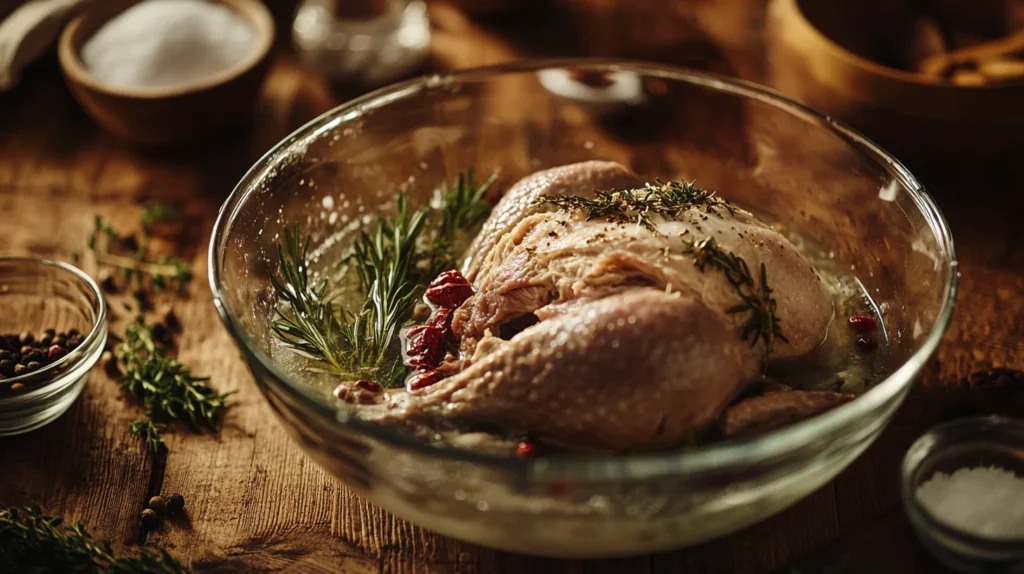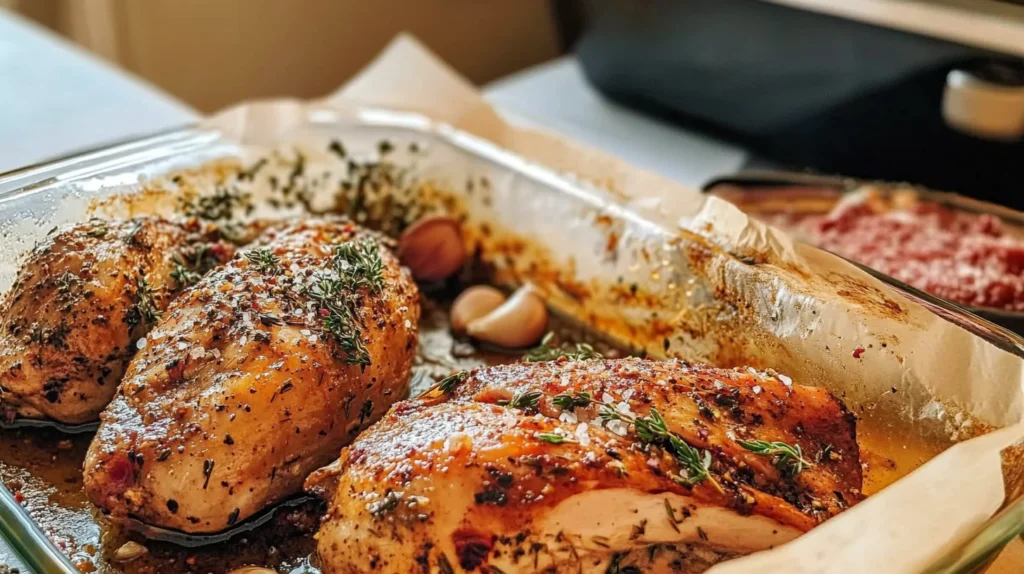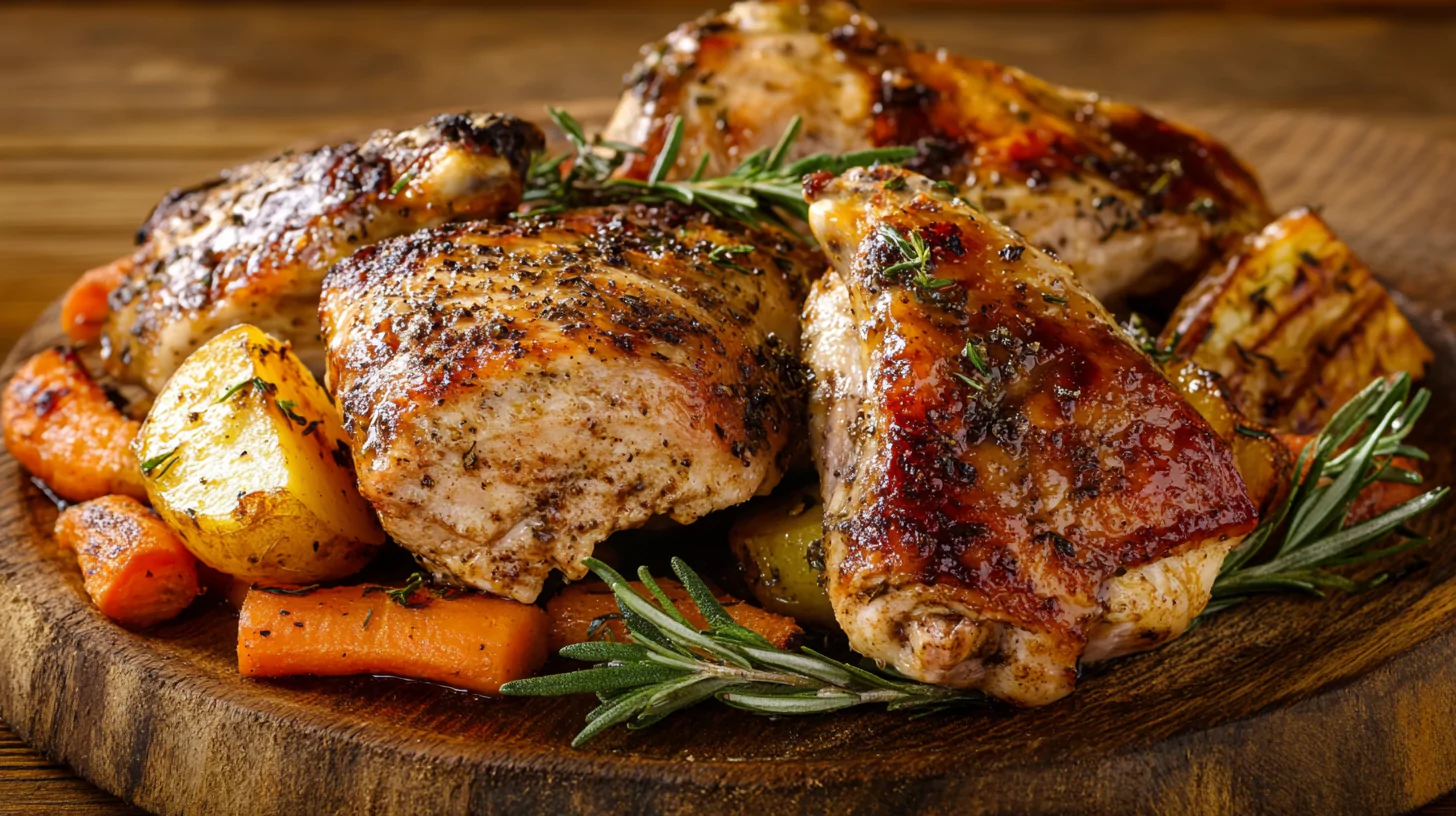Wild turkey is a favorite game bird for many hunters and food enthusiasts, but preparing it can be challenging due to its unique flavor and texture. Unlike domesticated turkeys found in supermarkets, wild turkey has a leaner build and a more robust, earthy taste that may not appeal to everyone if cooked without preparation.
One common method to improve the flavor and texture of wild turkey is soaking it before cooking. This practice is believed to tenderize the meat, reduce its gamey flavor, and ensure it cooks evenly. However, not everyone agrees that soaking is necessary, and some argue that it can strip away the natural essence of the meat.
In this article, we will explore whether you should soak wild turkey before cooking, the benefits and drawbacks of soaking, various soaking methods, and alternatives for preparing this delicious game bird. For more inspiration and creative preparation ideas, check out these wild turkey recipes to impress and savor every bite. By the end, you’ll have all the information you need to make an informed decision and cook a wild turkey that satisfies every palate.
Understanding Wild Turkey
Wild turkey is vastly different from its domesticated counterpart in terms of both nutrition and flavor. Unlike the farm-raised turkeys commonly sold in grocery stores, wild turkeys lead active lives, which results in leaner, firmer meat. Their diet of seeds, nuts, berries, and insects also contributes to a more intense and gamey flavor.
Key differences include:
- Texture: Wild turkey meat is less fatty, leading to a chewier texture if not cooked properly.
- Flavor Profile: Its gamey taste can be overpowering for those accustomed to mild, store-bought turkey.
- Nutrition: Wild turkey is generally lower in fat and higher in protein, making it a healthier option.
While these differences make wild turkey an exciting choice for adventurous eaters, they also present challenges in preparation. The lean structure means the meat can dry out quickly, and the strong flavor can be unappealing to some. This is where soaking comes into play.
Reasons to Soak Wild Turkey

Soaking wild turkey is a preparation method designed to address its unique characteristics. Below are the primary reasons why hunters and cooks opt for this approach:
- Reducing the Gamey Flavor Wild turkey’s distinct flavor comes from its diet and natural lifestyle. While this can be a treat for some, others may find the taste too intense. Soaking the meat in a brine, buttermilk, or acidic solution can help neutralize the strong flavor, making it more palatable.
- Tenderizing the Meat The active lifestyle of wild turkeys means their muscles are well-developed, which can result in tougher meat compared to store-bought turkey. Soaking can help break down the muscle fibers, making the meat softer and more enjoyable to eat.
- Ensuring Juiciness Lean meat like wild turkey tends to dry out during cooking. Soaking the meat can help it retain moisture, particularly if you’re using methods like roasting or grilling that expose it to high heat.
- Removing Impurities Soaking in a brine or buttermilk can draw out blood and impurities from the meat, ensuring a cleaner and more appealing final dish.
- Even Cooking Some cooks find that soaking helps the meat cook more evenly. This is especially useful when working with a bird that has been field-dressed and might have unevenly distributed moisture content.
Soaking wild turkey isn’t just about softening the texture or flavor—it’s about elevating the overall dining experience. By addressing its natural characteristics, you can prepare a dish that retains the essence of the game bird while making it accessible to all diners.
Methods of Soaking Wild Turkey
Popular Soaking Techniques for Wild Turkey
Preparing wild turkey requires attention to detail, and choosing the right soaking method can significantly impact the flavor, tenderness, and juiciness of the meat. Below are three popular soaking methods to consider when deciding should you soak wild turkey, each with its own benefits:
1. Brining
Brining is one of the most common methods for soaking wild turkey. It involves immersing the meat in a saltwater solution, often with added sugar and spices, to improve its texture and flavor.
How It Works
- Salt Content: The salt in the brine penetrates the meat, breaking down muscle proteins and making the turkey more tender.
- Moisture Retention: The process allows the meat to absorb water, preventing it from drying out during cooking.
- Flavor Boost: Additions like herbs, garlic, and citrus zest infuse subtle flavors into the meat.
Basic Brine Recipe
- Ingredients:
- 1 gallon of water
- 1 cup kosher salt
- 1/2 cup sugar (optional)
- Optional: bay leaves, peppercorns, rosemary, thyme, or garlic
- Instructions:
- Dissolve the salt and sugar in water. Add any additional flavoring agents.
- Submerge the turkey completely in the brine.
- Refrigerate for 12-24 hours.
Pros:
Brining improves moisture retention and mellows the gamey flavor of wild turkey.
Cons:
Over-brining can make the meat overly salty or waterlogged if left for too long.
2. Buttermilk Soak
For those looking to tenderize the meat while adding a subtle tang, buttermilk is an excellent soaking medium. This method is particularly popular in Southern cooking.
How It Works
- Acidity: Buttermilk contains lactic acid, which helps break down tough muscle fibers.
- Tenderness: The process results in softer, more succulent meat.
- Flavor Addition: The mild, creamy tang enhances the natural taste of the turkey without overpowering it.
How to Buttermilk Soak
- Ingredients:
- 1 quart of buttermilk
- 1 tablespoon of salt
- Optional: black pepper, paprika, or hot sauce for added flavor
- Instructions:
- Mix the buttermilk with salt and any optional spices.
- Place the turkey in a large bowl or resealable bag, ensuring the meat is fully submerged.
- Refrigerate for 8-12 hours.
Pros:
This method is excellent for tenderizing and flavor enhancement.
Cons:
It may not penetrate the meat as deeply as a brine, so it’s better suited for smaller cuts like breasts or thighs.
3. Vinegar or Citrus-Based Soaks
For a bright, zesty alternative, consider soaking your wild turkey in a solution of vinegar or citrus juice. This method is ideal for those who prefer a lighter, fresher flavor.
How It Works
- Acidity: Acids like vinegar or lemon juice soften the proteins in the meat.
- Flavor Balancing: These soaks are effective at reducing gamey flavors while adding a touch of brightness.
- Improved Texture: The acid reacts with the meat to create a softer texture.
Example Recipe
- Ingredients:
- 1 cup apple cider vinegar or lemon juice
- 2 cups water
- Optional: honey, crushed garlic, or herbs like thyme and oregano
- Instructions:
- Combine the vinegar or citrus juice with water and optional ingredients.
- Place the turkey pieces in the mixture, ensuring they are fully submerged.
- Let soak for 4-8 hours in the refrigerator.
Pros:
This is a quick and flavorful method for reducing gamey taste.
Cons:
Over-soaking in acidic solutions can make the meat mushy if left too long.
Which Method Is Best?
Each soaking method offers unique benefits, so the choice depends on your preferences and cooking goals:
- For moisture retention and flavor boosting, brining is the best option.
- For tenderizing and a creamy tang, opt for buttermilk.
- For a bright, fresh flavor, choose vinegar or citrus-based soaks.
Next, we’ll explore the benefits and drawbacks of soaking to help you make the most of your wild turkey preparation! Let me know if you’re ready to proceed.
Benefits and Drawbacks of Soaking Wild Turkey
The Benefits of Soaking Wild Turkey
Soaking wild turkey before cooking offers numerous advantages, especially for those seeking to improve its flavor, tenderness, and overall texture. Here’s a closer look at the key benefits:
1. Tenderizing the Meat
Wild turkey tends to be tougher than domesticated turkey due to its active lifestyle. Soaking, especially in acidic solutions like buttermilk or citrus juice, breaks down muscle fibers, resulting in softer, more palatable meat. This is particularly useful for cuts like the breast, which can be prone to dryness.
2. Reducing Gamey Flavor
For individuals who find wild turkey’s strong, earthy flavor overwhelming, soaking helps balance the taste. Brines, buttermilk, and vinegar solutions neutralize some of the boldness without stripping away the bird’s natural essence. This makes the meat more appealing to a broader audience, including those who may not typically enjoy game meat.
3. Retaining Moisture
Wild turkey is leaner than farm-raised varieties, which can lead to dryness during cooking. Soaking allows the meat to absorb liquids, ensuring it remains juicy and tender even when cooked at high temperatures. This is particularly important for methods like roasting or grilling, where moisture loss can be significant.
4. Flavor Enhancement
A well-prepared soak can do more than just neutralize the gamey taste—it can infuse the meat with additional flavors. Adding herbs, spices, and aromatics like garlic or onion to the soaking liquid creates layers of complexity that elevate the final dish.
5. Removing Blood and Impurities
Field-dressed wild turkey can sometimes retain traces of blood, particularly in the legs and thighs. Soaking draws out these impurities, leading to a cleaner, more appetizing appearance and taste.
The Drawbacks of Soaking Wild Turkey
While soaking offers many benefits, there are potential downsides to consider. Understanding these drawbacks will help you avoid common mistakes.
1. Over-Soaking
Soaking for too long can negatively affect the texture of the meat. For example:
- Brining: Extended exposure to saltwater can result in overly salty meat.
- Acidic Soaks: Prolonged soaking in buttermilk, vinegar, or citrus juice can break down proteins too much, leaving the meat mushy or unappealing.
2. Flavor Loss
In some cases, soaking may strip away too much of the natural flavor of the wild turkey. This can happen if the soaking liquid is too strong or the soaking time is excessive. For those who enjoy the unique taste of wild game, this could be a disadvantage.
3. Additional Preparation Time
Soaking requires planning and preparation, as most methods need several hours or even overnight to achieve the desired results. For cooks in a hurry, this extra step might feel inconvenient.
4. Risk of Diluting Flavor
Improperly proportioned soaking solutions can dilute the turkey’s flavor instead of enhancing it. This is especially true if too much water is used in a brine or if the spices and aromatics are not well-balanced.
Balancing Benefits and Drawbacks
To maximize the benefits and minimize the drawbacks:
- Follow recommended soaking times for your chosen method.
- Use balanced recipes for soaking solutions to avoid overpowering or diluting the flavor.
- Experiment with soaking methods to find what works best for your personal taste preferences.
Alternatives to Soaking Wild Turkey
While soaking is a popular method for preparing wild turkey, it is not the only approach to achieving tender, flavorful meat. If you prefer to skip the soaking process or want to try something different, here are several effective alternatives:

1. Marinating with Spices and Oils
Marination is an excellent way to enhance flavor and tenderize wild turkey without using soaking liquids like brine or buttermilk.
- How It Works: A marinade typically combines oil, acid, and seasonings to infuse flavor and break down muscle fibers.
- Ideal Ingredients:
- Oils: Olive oil or vegetable oil to lock in moisture.
- Acids: Lemon juice, vinegar, or yogurt for tenderizing.
- Spices and Herbs: Paprika, garlic powder, thyme, rosemary, or black pepper for flavor.
Example Marinade Recipe:
- 1/4 cup olive oil
- 2 tablespoons lemon juice
- 2 teaspoons minced garlic
- 1 teaspoon paprika
- 1 teaspoon dried rosemary
- Salt and pepper to taste
- Instructions: Coat the turkey in the marinade, place it in a resealable bag or covered dish, and refrigerate for 4-12 hours.
Advantages:
- Adds bold and customizable flavors.
- Tenderizes meat without excessive moisture.
Drawbacks:
- May not remove gamey flavors as effectively as soaking.
2. Dry Brining
Dry Brining is an excellent alternative to soaking when preparing wild turkey. It enhances flavor and tenderness, making it a great option for those wondering should you soak wild turkey.
- How It Works: Salt draws out moisture from the surface of the turkey, which is then reabsorbed, creating a natural brine effect.
- Basic Steps:
- Pat the turkey dry with paper towels.
- Rub kosher salt and your choice of spices all over the meat.
- Place the turkey on a wire rack in the refrigerator, uncovered, for 12-24 hours.
- Rinse off excess salt and pat dry before cooking.
Advantages:
- Enhances flavor without adding liquid.
- Creates a crispy skin when roasting or grilling.
Drawbacks:
- Requires precise seasoning to avoid over-salting.
3. Slow Cooking
Cooking methods that maintain low, steady heat can naturally tenderize wild turkey, offering an effective solution for those considering should you soak wild turkey.
- How It Works: Slow cooking breaks down collagen in the meat, making it tender while retaining moisture.
- Best Cooking Methods:
- Crockpot: Add the turkey with broth, vegetables, and spices. Cook on low for 6-8 hours.
- Sous Vide: Vacuum-seal the turkey with seasoning and cook in a water bath at a precise temperature for several hours.
Advantages:
- Retains moisture and tenderness naturally.
- Allows for rich, complex flavors with minimal preparation.
Drawbacks:
- May take longer than soaking or marinating.
4. High-Fat Cooking Techniques
Since wild turkey is lean, cooking methods that incorporate fat can help prevent dryness and enhance flavor.
- Options:
- Basting: Brush melted butter or oil over the turkey while it roasts.
- Wrapping: Wrap the turkey in bacon or place pats of butter under the skin before cooking.
- Frying: Deep-frying in oil locks in juices and adds a crispy texture.
Advantages:
- Adds richness and keeps meat juicy.
- Enhances flavor with minimal preparation.
Drawbacks:
- Higher calorie content due to added fat.
5. Using Broths and Aromatics
For a simpler alternative, cooking the turkey in a flavorful broth with aromatics (like onions, garlic, and herbs) ensures a juicy result.
- Steps:
- Place turkey pieces in a roasting pan or Dutch oven.
- Add chicken stock, chopped onions, garlic cloves, and fresh herbs like thyme or sage.
- Cover and bake at 325°F (163°C) until the meat is tender and fully cooked.
Advantages:
- Enhances natural flavors.
- Keeps the meat moist throughout cooking.
Drawbacks:
- Doesn’t reduce gamey flavors as effectively as soaking.
Which Alternative Is Best?
The ideal method depends on your preferences and cooking style:
- For quick and bold flavor, opt for marination.
- For flavor-packed and crispy results, try dry brining.
- For effortless tenderness, slow cooking is a great choice.
Each of these alternatives offers a unique way to prepare wild turkey without soaking, ensuring a delicious and satisfying meal.
Frequently Asked Questions (FAQs)
1. Should you soak all parts of the turkey?
Not necessarily. Soaking is most beneficial for tougher cuts, such as the breast and thighs, which can be dry or gamey. The legs, which are naturally richer in connective tissue, may not require soaking if cooked using methods like braising or slow roasting.
2. How long should you soak wild turkey?
The soaking time depends on the method used:
- Brining: 12-24 hours for optimal results.
- Buttermilk soak: 8-12 hours.
- Vinegar or citrus soak: 4-8 hours to avoid over-tenderizing. Over-soaking can negatively affect texture and flavor, so it’s important to follow timing recommendations.
3. Does soaking remove nutrients from wild turkey?
Soaking does not significantly reduce the nutritional value of wild turkey. While some water-soluble vitamins might leach into the soaking liquid, the impact is minimal compared to the benefits of improved flavor and tenderness.
4. What are the best soaking liquids for wild turkey?
The choice of liquid depends on your goal:
- Brine: For moisture retention and mild flavor enhancement.
- Buttermilk: For tenderizing and adding a subtle tang.
- Vinegar or citrus juice: To reduce gamey flavor and brighten the taste.
Experimenting with different liquids allows you to tailor the preparation to your preferences.
5. Can you skip soaking entirely?
Yes, soaking is optional. Alternatives like marination, dry brining, or slow cooking can achieve similar results. These methods often work better for those who want to preserve the natural flavor of wild turkey or avoid over-processing the meat.
6. What to do if the turkey becomes too salty after soaking?
If your turkey becomes too salty, you can:
- Rinse it thoroughly under cold water.
- Soak it in fresh water for an hour to dilute excess salt.
- Pair it with unsalted sides to balance the flavors.
Conclusion: Should You Soak Wild Turkey Before Cooking?
Soaking wild turkey is an effective way to tenderize the meat, enhance its flavor, and reduce the strong gamey taste that some people find unappealing. Techniques like brining, buttermilk soaks, and acidic solutions offer versatile options for preparing the bird to perfection.
However, soaking is not mandatory. Alternatives like marination, dry brining, and slow cooking can achieve similar results while allowing the natural flavor of the turkey to shine. The key is to choose a method that aligns with your taste preferences, cooking style, and time constraints when considering should you soak wild turkey as part of your preparation.
Ultimately, whether or not to soak wild turkey depends on your goals:
- If you want a mild, tender, and juicy bird, soaking is highly recommended.
- If you prefer a more natural gamey taste with less preparation, alternative methods may suit you better.
No matter which approach you choose, the right preparation techniques will ensure your wild turkey is a delicious centerpiece for any meal. With a little care and creativity, you can transform this lean, flavorful bird into a culinary delight that everyone will enjoy.

